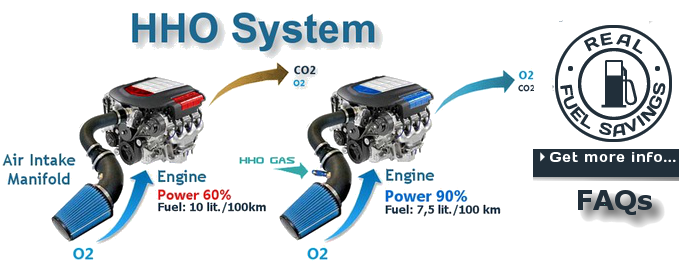Nos générateurs HHO utilisent l'électrolyse pour séparer l'eau (H₂O) en hydrogène (H₂) et en oxygène (O₂), formant ainsi du gaz HHO. Ce gaz est ensuite dirigé vers la chambre de combustion, via le collecteur d'admission d'air, où il se mélange à notre carburant habituel.
Nous utilisons une petite quantité de l'énergie de la voiture pour produire de l'hydrogène, mais lorsqu'il est ajouté à la combustion, il améliore l'efficacité, libérant plus d'énergie que celle utilisée pour produire l'hydrogène lui-même, réduisant ainsi considérablement la consommation de carburant et la pollution!

La NASA a mené plusieurs études sur l'utilisation de l'hydrogène comme carburant supplémentaire dans un moteur à combustion interne fonctionnant à l'essence. Leur recherche a démontré spécifiquement que la vitesse de flamme plus élevée de l'hydrogène permettait une plage de fonctionnement efficace plus étendue dans un moteur à essence. La combustion à rapport de mélange pauvre dans les moteurs à combustion interne a le potentiel de produire de faibles émissions et une efficacité thermique plus élevée pour plusieurs raisons:
1. L'excès d'oxygène dans la charge oxyde davantage les hydrocarbures imbrûlés et le monoxyde de carbone.
2. L'excès d'oxygène réduit les températures de combustion maximales, inhibant la formation d'oxydes d'azote.
3. Les températures de combustion plus basses augmentent le rapport de chaleur spécifique du mélange en réduisant les pertes nettes de dissociation.
4. À mesure que le rapport de chaleur spécifique augmente, l'efficacité thermique du cycle s'améliore également, ce qui peut conduire à une meilleure économie de carburant.

Caltech, a également mené des recherches sur le calcul de l'efficacité thermique de l'économie de carburant du système en utilisant de l'hydrogène supplémentaire. L'efficacité globale du moteur augmente et dépasse la perte d'énergie encourue pour générer l'hydrogène, ce qui entraîne une amélioration de l'économie de carburant pour l'ensemble du système.
![]()
Couple Moteur
Une augmentation moyenne de 19,1% du couple moteur est obtenue en utilisant le HHO par rapport à un fonctionnement au diesel pur. Le gain de puissance est dû à la concentration d'oxygène dans le gaz HHO et à l'amélioration du mélange du HHO avec l'air et le carburant, ce qui améliore la combustion.

Les résultats montrent que l'ajout de HHO peut considérablement élargir la région inflammable et étendre la limite d'inflammabilité à des rapports d'équivalence plus faibles. Comme le gaz HHO a une faible énergie d'allumage et une vitesse de flamme rapide, le mélange HHO-diesel s'enflamme plus facilement et brûle plus rapidement que le carburant diesel pur. Ainsi, un couple amélioré à haute vitesse peut être obtenu.
![]()
Température du Moteur
La vitesse de flamme laminaire élevée du HHO réduit le délai d'allumage et raccourcit la période de combustion, ce qui entraîne des pertes de chaleur plus faibles et un processus de combustion plus proche des conditions idéales de volume constant. Cela se traduit par un taux de compression accru et une efficacité thermique plus élevée, ce qui abaisse la température du moteur.
![]()
Bruit du Moteur
La vitesse de combustion élevée de l'hydroxy entraîne une augmentation plus rapide de la pression et de la température, ce qui peut minimiser le cliquetis, surtout dans des conditions de ralenti (faible ou pas de charge). De plus, la réduction de la période de délai d'allumage conduit à une diminution du bruit du moteur.
![]()
Consommation de Carburant
Un gain moyen de plus de 20% en SFC (Consommation Spécifique de Carburant) est obtenu en utilisant le système HHO. La réduction de la consommation de carburant est due au mélange uniforme du HHO avec l'air (haute diffusivité du HHO) et à la présence accrue d'oxygène, ce qui aide à la combustion du diesel et améliore l'efficacité. Les économies les plus importantes se produisent à haute vitesse car le carburant diesel est difficile à brûler complètement dans des conditions pauvres en raison de la fraction de gaz résiduel accrue et du mauvais mélange. Comme le HHO a une vitesse de flamme élevée et une large plage d'inflammabilité, l'ajout d'hydrogène aide le carburant à brûler plus rapidement et plus complètement.

![]()
Émissions de Carbone
Une réduction moyenne de 13,5% des émissions de CO est obtenue à des vitesses moyennes et élevées du moteur. L'absence de carbone dans le gaz HHO est un facteur majeur dans la réduction du CO. La large plage d'inflammabilité et la vitesse de flamme élevée du gaz HHO permettent au moteur de fonctionner à des charges plus faibles. Le mélange de carburant HHO-diesel brûle plus rapidement et plus complètement que le carburant diesel pur. Ainsi, les émissions de CO à haute vitesse et dans des conditions pauvres sont efficacement réduites après l'ajout de HHO. Comme le gaz HHO contient de l'oxygène, une efficacité de combustion plus élevée est obtenue, ce qui entraîne des émissions de CO plus faibles.
Panier
Aucun produit
Expédition
0,00 €
Total
0,00 €
 User Online
User Online
Today Accessed: 3614
Total Accessed: 798741
Your IP: 216.73.216.108
Derniers clients
- Domenico B. casapulla
- John H. Glasgow
- Pierre B. LARAGNE
- FERNANDO B. valdemorillo
- Thierry B. Cuqueron
- Laszlo A. Uderns
- Jean-Marie C. La Motte-Servolex
- Mircea N. Madrid ( coslada)
- Sergey K. Niestetal
- Vasile Sebastian O. Oberwölbling
- Christian G. Preith
- Roberto B. PESCIA
- Celso F. Pontevedra
- Michail S. Minden
- Eduard G. Waterloo
- Iván M. Puerto de Alcudia
- Apolinar V. Albese Con Cassano
- Wilhelm P. Rudersdorf
- AX M. Neuviller-la-Roche
- Koos G. Almere
- Andreas K. Geesthacht
- İskandar A. Baku
- Nicolas B. AITON
- Richard K. Klettgau-Erzingen
- Angelo C. Odelzhausen
- Raphael P. Servon
- Lucien B. Vernou la celle sur seine
- DAVIDE M. CALENZANO
- Philipp S. Fischenthal
- Jean-yves R. Ventabren
Last Orders
Here you can view our last shipped orders.
1x HHO Water Tank 1.2L
 Send to > Allemagne
Send to > Allemagne
1x HHO Water Tank 1.2L
 Send to > Allemagne
Send to > Allemagne
1x Kit DC3000 pour Voitures
 Send to > Italie
Send to > Italie
1x Kit DC3000 pour Voitures
 Send to > Italie
Send to > Italie
1x Kit DC3000 pour Voitures
 Send to > Italie
Send to > Italie
1x 60A CCPWM Courant constant - Contrôle Électronique - Modulateur de Fréquence
 Send to > Italie
Send to > Italie
1x 60A CCPWM Courant constant - Contrôle Électronique - Modulateur de Fréquence
 Send to > Italie
Send to > Italie
1x 60A CCPWM Courant constant - Contrôle Électronique - Modulateur de Fréquence
 Send to > Italie
Send to > Italie
2x Système de contrôle du niveau d'eau
 Send to > Italie
Send to > Italie
2x Système de contrôle du niveau d'eau
 Send to > Italie
Send to > Italie
2x Système de contrôle du niveau d'eau
 Send to > Italie
Send to > Italie
1x Électrolyte. Hydroxyde de potassium KOH
 Send to > Italie
Send to > Italie
1x Électrolyte. Hydroxyde de potassium KOH
 Send to > Italie
Send to > Italie
1x Électrolyte. Hydroxyde de potassium KOH
 Send to > Italie
Send to > Italie
1x Kit DC2000 pour Voitures
 Send to > Suisse
Send to > Suisse
1x Kit DC2000 pour Voitures
 Send to > Suisse
Send to > Suisse
1x Kit DC2000 pour Voitures
 Send to > Suisse
Send to > Suisse
2x Système de contrôle du niveau d'eau
 Send to > Suisse
Send to > Suisse
2x Système de contrôle du niveau d'eau
 Send to > Suisse
Send to > Suisse
2x Système de contrôle du niveau d'eau
 Send to > Suisse
Send to > Suisse
1x Kit DC3000 pour Voitures
 Send to > Suisse
Send to > Suisse
1x Kit DC3000 pour Voitures
 Send to > Suisse
Send to > Suisse
1x Kit DC3000 pour Voitures
 Send to > Suisse
Send to > Suisse
2x 60A CCPWM Courant constant - Contrôle Électronique - Modulateur de Fréquence
 Send to > Suisse
Send to > Suisse
2x 60A CCPWM Courant constant - Contrôle Électronique - Modulateur de Fréquence
 Send to > Suisse
Send to > Suisse
2x 60A CCPWM Courant constant - Contrôle Électronique - Modulateur de Fréquence
 Send to > Suisse
Send to > Suisse
1x 60A CCPWM Courant constant - Contrôle Électronique - Modulateur de Fréquence
 Send to > France
Send to > France
1x 60A CCPWM Courant constant - Contrôle Électronique - Modulateur de Fréquence
 Send to > France
Send to > France
1x 60A CCPWM Courant constant - Contrôle Électronique - Modulateur de Fréquence
 Send to > France
Send to > France
1x Électrolyte. Hydroxyde de potassium KOH
 Send to > France
Send to > France
Informations
Catégories



